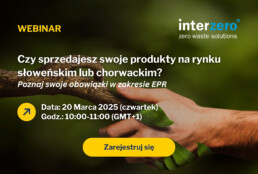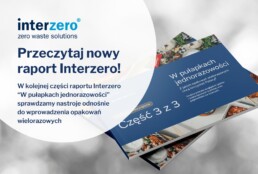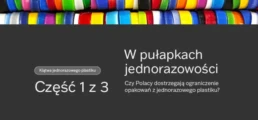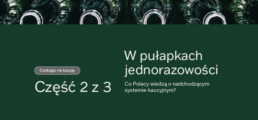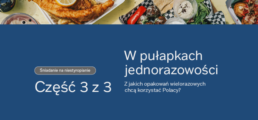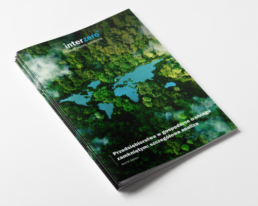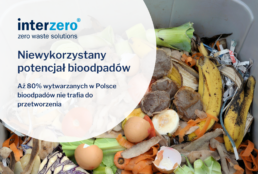Recycling protects resources: Interzero publishes climate and resource balance sheet
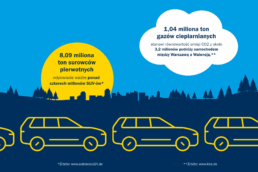
Recycling is about conserving resources: in 2024, Interzero saved approximately 1.04 million tonnes of greenhouse gas emissions and 8.09 million tonnes of primary resources
A study by Fraunhofer UMSICHT again confirms the positive impact of circular solutions and recycling on climate and resource savings. By recycling 1.94 million tonnes of materials in 2024, Interzero saved around 1.04 million tonnes of greenhouse gas emissions and 8.09 million tonnes of primary resources. The main factor for these savings at Interzero was the circular management of plastics.
Berlin/Cologne
Securing the future through the circular economy: recycling is an effective tool for reducing pressure on the planet and meeting Europe's climate neutrality targets. The Interzero study "resources SAVED by recycling 2024", published today, illustrates the tangible benefits for climate and resource protection: according to calculations by the Fraunhofer Institute UMSICHT, Europe's leading provider of closed-loop economy services recycled around 1.94 million tonnes of materials in 2024, saving 8.09 million tonnes of primary resources. This is equivalent to the weight of more than four million SUVs*. At the same time, Interzero's recycling activities avoided a total of 1.04 million tonnes of greenhouse gas emissions. This is equal to the CO₂ emissions from around 3.2 million individual car journeys between Interzero's locations in Warsaw and Valencia**.
"Every resource counts - the circular economy combines resource conservation with responsibility for future generations." says Jan Kroker, CEO of Interzero Group. "Together with our customers, we drive sustainable innovation that delivers environmental benefits and increases economic competitiveness."
Example: With its internationally recognised Competence Centre for Recycled Plastics, Interzero supports industry and trade in the transition to recyclable plastic packaging and the use of recycled materials. This allows companies to better position themselves in the market - and also to meet the legal requirements of the new European Packaging and Packaging Waste Regulation (PPWR), which came into force in February 2025.
The results of the Fraunhofer UMSICHT study also underline the importance of consistent recycling, particularly in plastics and lightweight packaging: this fraction accounts for 49.9% of the total amount of materials recycled - and is responsible for the greatest environmental impact: in 2024, Interzero achieved 54% of resource savings and as much as 62% of total greenhouse gas savings by recycling petroleum-based materials.
"These figures confirm our commitment to modern plastics recycling and motivate us to further improve our recycling of Yellow Bag packaging waste," says Jan Kroker.
From household waste segregation to advanced sorting and processing: many elements need to work smoothly for raw materials to be efficiently recycled. With the study "resources SAVED by recycling", Interzero has been providing important arguments for circular transformation for more than 15 years. The annual Fraunhofer UMSICHT calculations not only demonstrate the positive environmental effects of Interzero's activities, but also support the company's customers in communicating transparently about sustainability.
* Conversion examples are based on (sources):
https://www.autoscout24.de/informieren/ratgeber/kfz-technik/gewicht-von-autos-frueher-und-heute/
** Basis of calculation: average CO₂ emissions of new passenger cars registered in Germany in 2024 according to the Federal Office for Motor Transport, www.kba.de.
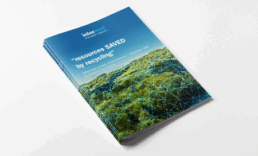
Leaflet for the study "resources SAVED by recycling" 2024
About Interzero
Interzero is one of the leading providers of product, material and logistics closure services and an innovation leader in plastics recycling with the largest sorting capacity in Europe. Under the slogan 'zero waste solutions', the company supports more than 80,000 customers across Europe in the responsible management of recyclable materials, helping them to improve their own sustainability performance and save primary resources. With around 2,000 employees, the company has a turnover close to one billion euros. According to Fraunhofer UMSICHT, Interzero's recycling activities could save 1.04 million tonnes of greenhouse gases compared to primary production and 8.09 million tonnes of primary raw materials in 2024 alone. As a pioneer of the circular economy, Interzero is the winner of the German Sustainability Award and a related special award in the field of 'Resources' for 2024.
Recycling fee 2025 - who and when must pay the fee for plastic bags?
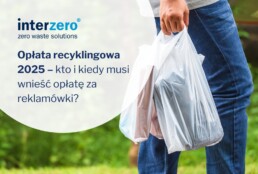
Recycling fee 2025 - who and when must pay the fee for plastic bags?
Shop owners and wholesalers who offer plastic bags to their customers are required to pay a recycling fee. How much is the fee for plastic bags in 2025 and when does it have to be paid? Learn the most important information about the recycling fee.
What is subject to the recycling fee?
The recycling fee applies to all plastic shopping bags . with the exception of the so-called break-ins , i.e. very light bags made of material less than 15 micrometers thick, which are:
- necessary for hygiene reasons,
- used as primary packaging for loose foods (as long as they prevent food waste).
This means that the recycling fee is not charged, for example, for shopping bags on a roll or plastic bags used for packing fresh bread, fruit and vegetables, meat, cheese, etc.
Entrepreneur's obligations related to the recycling fee
Every entrepreneur running a shop or wholesale store (retail or wholesale trade entity) where plastic shopping bags are offered to customers is obliged to :
- collecting a recycling fee from buyers (customers),
- transferring the collected recycling fee to the appropriate bank account within the set deadlines,
- keeping records of the number of bags purchased and issued (light, i.e. from 15 to 40 microns and others, i.e. 50 microns and more) in paper or electronic form. Owners of several sales outlets must keep separate records for each of them,
- submitting an annual report on the number of plastic bags purchased and issued to customers (so-called packaging and product reports ).
Recycling fee rate 2025 - how much is the fee for plastic bags?
From 1 September 2019, the recycling fee rate is 20 PLN for each plastic shopping bag, regardless of its thickness.
The recycling fee may be included in the total purchase cost of such a bag or may be added to the price of the bag set by the seller.
Until when is the recycling fee due in 2025?
The recycling fee is settled quarterly. It is paid by the 15th day of the month following the quarter in which the fee was collected.
In 2025 the recycling fee must be paid:
- for the first quarter - until April 15, 2025,
- for the second quarter - until July 15, 2025,
- for the third quarter - until October 15, 2025,
- for the fourth quarter - until January 15, 2026
Do you charge a recycling fee? You are required to register with BDO!
Owners of shops and wholesalers obliged to collect the recycling fee are also obliged to obtain an entry in the BDO register. An application for entry must be submitted before starting commercial activity . For selling plastic bags to customers without the required entry in the BDO, the entrepreneur can receive a fine from PLN 5,000 to PLN 1 million!
Do you want to handle formalities without any problems? Entrust your BDO registration to Interzero experts!
After registering with BDO , you will receive a registration number , and the province marshal will create an individual account for your company in the system and send you a login and password. An account in the BDO register is necessary to submit an annual report on the number of bags purchased and issued to customers with a thickness of 15 to 49 micrometers and 50 and more micrometers - this obligation can only be fulfilled electronically!
FAQ
Find answers to frequently asked questions about the recycling fee for plastic bags.
The recycling fee is paid by the buyer (usually the consumer) of the plastic bag. The entrepreneur selling the bag only collects the recycling fee and transfers it to the province marshal.
The recycling fee applies to all plastic bags, except for very lightweight bags (material thickness less than 15 micrometres) used for hygiene reasons or as primary packaging for loose food products (provided they prevent food waste).
Yes, provided they are made available to buyers for hygiene reasons or as primary packaging for loose food . In other cases, e.g. when the so-called tear-offs are used to pack products in packages or products other than food, a recycling fee must be paid for them.
Yes . The buyer of a plastic bag is required to pay a recycling fee, and the entrepreneur selling the bag is required to collect it and then transfer it to the bank account of the voivodeship marshal within a specified period. The exception are bags with a material thickness of less than 15 micrometers , provided they are used for hygiene reasons or as primary packaging for loose food, which prevents its waste.
The recycling fee collected from customers is paid into the account kept by the marshal of the voivodeship appropriate to the place of business activity .
NO . The recycling fee regulations only apply to plastic bags.
Want to offer your customers more sustainable alternatives to plastic bags? Check out what to use to replace tear-offs and disposable plastic bags!
What's new at Interzero? Check out the February summary
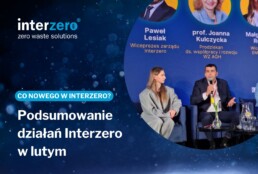
How was February at Interzero? Read the monthly summary
The past month was full of important events and initiatives at Interzero. As part of the educational campaign Eco without the angles, we published the third part of the report "In the traps of single-use", which analysed the approach of Poles to reusable packaging. We also actively participated in the Sustainable Industry Lab 2025, where the presentation of the Waste Platform 2.0, which makes it easier for entrepreneurs to fulfil their environmental obligations, aroused particular interest. Check out what's new at Interzero below!
EkoPaka - we are not slowing down
In February, the pilot edition of our flagship educational programme EkoPaka ended. 100 classes from Warsaw and the surrounding area received boxes filled with materials supporting teachers in conducting interesting and engaging classes on paper. Students learned how paper is produced, how often it accompanies us in everyday life, how important its proper segregation is and whether it is possible to recycle it. At the same time, they practiced their manual skills and creativity. During classes, they built a cardboard forest, conducted an investigation in their school on the use of paper, created posters, collages and many other beautiful works. Also this month, we finished recruitment for the second edition of EkoPaka on bio-waste. This time, as many as 200 packages will be sent to schools. We encourage you to follow our website and social media profiles.
Reusable vs. disposable - how do Poles perceive takeaway packaging?
The past month has brought important conclusions regarding the future of reusable packaging. Our new report examines how Poles perceive alternatives to single-use plastic, which, according to the SUP directive, must have a reusable option since July last year. This is the third installment of the series "In the traps of single-use plastics", in which Interzero analyses the consequences of the SUP (Single-Use Plastics) directive for everyday consumer decisions. This time, the experts focused on takeaway habits and checked what features the ideal reusable packaging should have according to Poles. The full report is available for download on the Eko Bez Kantów website .
Interzero at Sustainable Industry Lab 2025
Our experts shared their knowledge on technological solutions supporting sustainable development and how to effectively manage waste. The speakers included: Paweł Lesiak, Vice President of the Management Board, Łukasz Czarnowski, Digital Sales Cross Country Function Head and Robert Kowal, Business Development Manager. The discussions concerned, among others: digital challenges in waste management, the role of IT tools in ESG reporting, the importance of reliable data in ESG strategy - how their analysis helps to reduce emissions and build transparency of companies' activities, growing consumer awareness - why education and an innovative approach to sustainable development are so important for the future of business. You can read more about the speeches on our fanpage.
Selling to Spain? Remember your EPR obligations!
If you export your products to the Spanish market, you must comply with the requirements of Extended Producer Responsibility (EPR). Spanish regulations cover both local companies and foreign companies that introduce to the market: packaged products (domestic, commercial, industrial), electrical and electronic equipment (EEE), batteries, accumulators and devices containing them. Companies outside Spain must appoint an authorized representative to handle the formalities on their behalf . With Interzero it's easy! Simply sign the agreement and we will take over your EPR obligations. We will provide full support in registration, reporting and ongoing implementation of environmental obligations, regardless of the scale of operations.
Interzero 2025 Environmental Conference - save the date!
The 2025 Environmental Conference is getting closer! On June 3-4, we will meet at the Warszawianka Hotel near Serock to discuss the most important legal changes in the field of environmental protection. This is an event that you cannot miss if you want to stay up to date with regulations regarding SUP, ROP, PPWR and ESG. In March, there is a -15% discount on the regular price, so it's the perfect time to register! The event agenda is almost ready. See you in June!
Environmental Report 2024
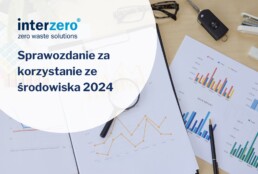
Environmental Report 2024
Entities that release gases or dust into the air and store waste are required to submit annual reports and calculate the fees due. These obligations result from the Environmental Protection Act and apply not only to companies, but also to institutions, individuals and other entities using the environment.
What is an environmental report?
The report on the use of the environment is a document prepared annually by companies, institutions and individuals using the environment. It contains information on the extent to which a given entity used the environment and the amount of fees it should pay for this.
The report on the use of the environment may consist of one or more lists - their number and type depend on the type of activity conducted by the entity and the extent to which it used the environment.
Who must submit a report on the use of the environment?
A report on the use of the environment is required to be submitted by entities that in a given calendar year:
- released gases or dust into the air from various processes (e.g. from boiler rooms, use of company combustion vehicles, poultry farming or breeding),
- were issued emission allowances ,
- stored waste .
These entities include:
- entrepreneurs (also foreign ones),
- organisational units that are not entrepreneurs (e.g. foundations, associations, schools),
- persons conducting agricultural production activities, e.g. agricultural cultivation, animal breeding or husbandry, horticulture, market gardening, forestry and inland fishing,
- other natural persons who use the environment to the extent that this requires a permit.
Importantly, there is no obligation to submit a report if the calculated annual fee for one type of use of the environment does not exceed PLN 100.
By when should information on the use of the environment be submitted for 2024?
The report on the use of the environment for a given calendar year must be submitted by 31 March of the following calendar year.
This means that the deadline for submitting the report on the use of the environment for 2024 expires on 31 March 2025. We remind you that the deadline for paying the fees calculated in the report expires on the same day!
How to submit a report on the use of the environment?
The report on the use of the environment is submitted to the marshal of the voivodeship competent for the place of use of the environment:
- in person (during a visit to the Marshal's Office),
- by letter,
- electronically (via ePUAP), by signing the document with a qualified signature or trusted profile.
Entities using the environment can also entrust the preparation and submission of the list of the scope of use of the environment to Interzero experts . We have been fulfilling reporting obligations on behalf of our clients for many years. We therefore have a long practice and rich experience in comprehensive, professional service of various entities using the environment. Write to us at our e-mail address or use the contact form . We will help you identify your obligations and submit the necessary documents on your behalf: quickly, reliably and without engaging your time.
Discover our full range of environmental reporting >>
If you use the environment, you can also prepare the report yourself by filling in:
- mandatory: a list containing a summary of information on the scope of use of the environment (if the fee for using the environment exceeds PLN 100),
- if you release gases or dust into the air: a list containing information on the amount and types of gases or dust released into the air,
- if you have emission allowances: a list containing information and data on the volume of greenhouse gas emissions covered by the emission trading system and the number of emission allowances and the amount of fees due,
- if you store waste: a list containing information about the waste stored.
The current templates of these lists can be found in the annexes to the Regulation of the Minister of Climate of 11 December 2019 on lists containing information and data on the scope of use of the environment and the amount of fees due (Journal of Laws 2019, item 2443).
The EkoPłatnik application, which is provided by some marshal's offices, helps in preparing the report. After preparing the report, however, it should be submitted in one of the forms mentioned above.
FAQ
Find answers to frequently asked questions about the environmental impact report.
The list and information on the scope of use of the environment do not have to be submitted by entities for which the calculated annual fee for one type of use of the environment does not exceed PLN 100 .
Information on the use of the environment consists of:
- in person at the Marshal's Office competent for the place of use of the environment,
- by e-mail to the address of the Marshal's Office responsible for the place of use of the environment,
- electronically (via ePUAP), by signing the document with a qualified signature or trusted profile.
Remember that reports prepared in the EkoPłatnik service must then be submitted in one of the indicated ways! The service does not allow for automatic submission of documents.
Depending on the type of business you run, you must complete one or more of the following lists:
- mandatory: a list containing a summary of information on the scope of use of the environment (if the fee for using the environment exceeds PLN 100),
- if you release gases or dust into the air: a list containing information on the amount and types of gases or dust released into the air,
- if you have emission allowances: a list containing information and data on the volume of greenhouse gas emissions covered by the emission trading system and the number of emission allowances and the amount of fees due,
- if you store waste: a list containing information about the waste stored.
NOTE: If the fee calculated for a given calendar year for one type of use of the environment does not exceed PLN 100, you do not have to complete or submit any of the lists!
You do not have to pay for using the environment if the fee for a given calendar year for one type of use of the environment does not exceed PLN 800. If at the same time this fee is higher than PLN 100, you are obliged to submit a report within the statutory deadline
Yes. However, it should be remembered that the province marshal may calculate the fee based on his own findings or findings made as a result of the WIOŚ inspection of your company. For this reason , we encourage you to settle any reporting arrears as soon as possible . Our experts will be happy to help you identify all of your company's obligations and complete outstanding and current formalities. Write to us and see how we can help you!
Environmental Fee 2024 and 2025 - the most important information for entrepreneurs
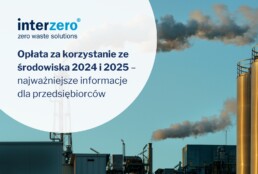
Environmental Fee 2024 and 2025 - the most important information for entrepreneurs
The Environmental Protection Act imposes on entities using the environment the obligation to pay an environmental fee. If your company's activities affect the environment, it is probably your obligation to calculate and pay the fee. Who should pay the fee and by when? Where is the best place to check the current rates of the fee for using the environment? We advise.
What does the environmental fee concern and what does it result from?
Entities using the environment are required to pay a fee, sometimes called an environmental fee. It is a kind of compensation for damage to the natural environment resulting from the activities of a company, institution or individual.
The obligation to pay an environmental fee applies to the following activities :
- resulting in the emission of gases or dust ,
- requiring emission rights ,
- related to waste storage .
The amount of the fee for using the environment depends mainly on the amount and types of dust and gases released into the air and on the amount and type of waste stored, as well as on the time of their storage.
The funds raised from fees are mainly allocated to national and provincial environmental protection funds.
Who has to pay the environmental fee?
Fees for using the environment must be paid by entities using the environment , which include:
- entrepreneurs ,
- organisational units that are not entrepreneurs ,
- persons conducting agricultural production activities ,
- other natural persons who use the environment to the extent that a permit is required .
Obliged entities must also independently determine the amount of the fee for a given calendar year and then pay it to the appropriate bank account. The amount of the annual environmental fee is calculated in the report for the use of the environment.
NOTE: the fee for use of the environment is not payable if it does not exceed PLN 800 for one of the types of use of the environment (e.g. for the introduction of dust and gases).
What are the environmental fee rates?
The rates of the environmental fee change in each reporting year . The list of rates is published in the annual announcement of the Minister of Climate and Environment.
The fee for the release of gases and dust is calculated based on the actual annual emission values specified in the report to the National Database on Emissions of Greenhouse Gases and Other Substances kept by the National Centre for Emission Balancing and Management IOŚ-PIB (KOBiZE).
Entities that use the environment without having a permit or decision required by law must pay an increased fee. Do you need support in obtaining permits, approvals or decisions? Entrust the preparation of all environmental documentation to Interzero!
Environmental fee rates for 2024
The upper unit rates of the environmental fee applicable in 2024 were as follows:
- PLN 512.23/kg of gases or dust released into the air,
- PLN 375.25/Mg (tonne) of waste placed in landfill.
The unit fee rates for individual gases, dust and waste can be found in the table attached to this document. Announcement of the Minister of Climate and Environment of August 4, 2023 regarding the rates of fees for the use of the environment for 2024 . If you pay a fee for gases or dust released into the air from combustion processes in diesel fuel engines, use the updated rate from the announcement of November 3, 2023 for calculation purposes.
Environmental fee rates for 2025
The upper unit rates of fees for use of the environment in 2025 have been set at the following level:
- 570.62 PLN/kg of gases or dust released into the air,
- PLN 418.03/Mg (tonne) of waste placed in landfill.
The unit fee rates for individual gases, dust and waste can be found in the table attached to this document. Announcement of the Minister of Climate and Environment of 28 July 2024 regarding the rates of fees for the use of the environment for 2025 .
By what time is the environmental fee due? Deadlines
The environmental fee is payable by 31 March of the current year for the previous year. This means that the environmental fee for 2024 must be paid by 31 March 2025 (Monday).
The environmental fee should be paid into the account of the Marshal's Office competent for the place of registration of the entity using the environment (for gases and dust) or for the place of use of the environment (for others).
Who does not pay the environmental fee? Exemption catalogue
The financial consequences of using the environment do not apply to the smallest entities whose activities have a small impact on the environment - therefore, the fee for using the environment is not paid if it does not exceed PLN 800 for one type of use of the environment (e.g. for the introduction of dust and gases).
Entities for which the calculated fee for one type of use of the environment is between PLN 100 and PLN 800 are only required to submit a list of the scope of use of the environment. If the fee is less than PLN 100, submitting a list is not necessary.
Are you selling your products on the Slovenian or Croatian market? Join our free webinar in English
Are you selling your products on the Slovenian or Croatian market? Join our free webinar in English
If you are a company based outside Slovenia or Croatia but sell your products to end consumers in these markets, you are subject to a number of environmental obligations. To gain valuable information and avoid potential penalties, we invite you to join our free webinar on Thursday, March 20.
Know your EPR responsibilities
Webinar Do you sell your products on the Slovenian or Croatian market? Get to know your EPR obligations
in English will take place on Thursday, March 20 from 10:00.
Our speakers, both environmental consultants, Katariina Jerbić from Croatia and Matej Marka from Slovenia , will present environmental obligations, focusing mainly on extended producer responsibility (EPR) in Slovenia and Croatia.
Join our session and learn about the following topics:
- Environmental Obligations in Slovenian and Croatian Law - Introduction
- Extended Producer Responsibility (EPR) explained
- Mandatory waste streams in Slovenia and Croatia
- Licensing requirements for e-commerce sellers and manufacturers
- Who is required to have an authorized representative in Croatia and Slovenia
- Reporting
- Best practices and support for companies
- Q&A session
The complexity and volume of environmental responsibilities can be stressful if you don't have a reliable partner by your side. That's why we encourage you to take advantage of this free opportunity to expand your knowledge with our specialists.
BDO Annual Packaging Report 2024 - the most important information about the report on products, packaging and waste management
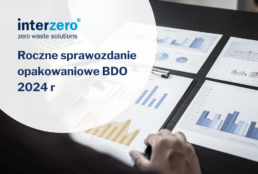
BDO Annual Packaging Report 2024 - the most important information about the report on products, packaging and waste management
One of the annual obligations of those introducing packaged products, packaging and certain types of products is to prepare a report in the BDO. What is the scope of the packaging report in BDO? Who has to submit them and by when? Discover the most important information about the report on products, packaging and waste management.
What does the BDO packaging report concern?
The packaging report is a document containing information on the quantities and types of of packaging and products that the entrepreneur introduced to the market in a given calendar year , as well as on the types and masses of packaging and post-consumer waste that the entrepreneur recovered and recycled during that period .
The catalogue of packaging and products covered by the report on products, packaging and the management of waste generated from them includes:
- individual, transport and collective packaging, including plastic bags covered by the recycling fee,
- tires,
- oils and greases,
- vehicles,
- electrical and electronic equipment (including used ones),
- batteries and accumulators,
- selected disposable plastic products,
- fishing gear.
The exact scope of the report on products, packaging and the management of waste generated from them depends on the type of activity conducted by the company in a given calendar year.
Who reports on products and packaging for 2024?
The following entities are required to submit a packaging and product report to BDO for 2024:
- packaging manufacturers and exporters,
- manufacturers, exporters, importers and entrepreneurs carrying out intra-Community supplies of packaged products,
- introducing disposable plastic products covered by the SUP Act,
- introducing oils, lubricants and tires (including automotive stores and wholesalers),
- sellers of RTV, household appliances, consumer electronics and other electrical equipment,
- vehicle sellers and importers,
- shops and wholesalers that offer plastic shopping bags to customers,
- deposit system operators (representing entities),
- authorised representatives introducing electrical and electronic equipment.
The full list of entities required to submit an annual report on products, packaging and the management of waste generated from them can be found in Article 73 of the Waste Act.
Entrepreneurs who are required to submit a report must be entered into the BDO register and given an individual registration number! If your company has not yet obtained an entry, use our support in registering in the BDO .
When should the packaging report for 2024 be submitted?
The packaging and product report is submitted by 15 March of the current year for the previous year.
In 2025, the deadline for submitting the report on products, packaging and the management of waste generated from them for the year 2024 is Monday, March 17 , 2025 - March 15 is a Saturday, i.e. a day off, which causes the deadline to be postponed to the next business day, which is March 17, 2025.
Entrepreneurs who have ceased their business activity are obliged to submit a packaging report within 7 days of the date of termination.
How to submit a report on products, packaging and the management of waste generated from them?
The report on products, packaging and management of waste generated from them should be submitted electronically, via an individual account in the BDO system . The submitted report will be sent to the voivodeship marshal appropriate for the place of business.
You can complete your BDO report on products, packaging and the management of waste generated from them on your own or with the help of Interzero experts.
-
How to submit the BDO 2024 report yourself?
Log in to your BDO account. From the menu on the left, select "Reporting" and then press the "Reporting on products, packaging and waste management " button. After going to the list of reports, click the "+ New report" button. You will be redirected to a form containing fields in which you should enter data about your company.
-
How to transfer BDO reporting to Interzero environmental experts?
Do you want to save time and avoid costly mistakes ? Do you prefer to focus on your business and leave formalities to experts? We will gladly take over your reporting obligations at BDO. Fill out our contact form and describe what support you need . Our expert will contact you immediately to learn about your expectations and discuss the details of cooperation.
By choosing Interzero you will gain peace, security and certainty of reliable, timely fulfillment of the reporting obligation . You will also receive access to the My Interzero portal, with the help of which you will quickly and conveniently provide us with the quantities and weights of introduced packages and products. We will take care of the rest!
Do you have other reporting obligations? Check out what other reports we can prepare on your behalf!
What information should a packaging, product and waste management report contain?
Each report on products, packaging and the management of waste arising from them shall include a set of information identifying the submitting entity (i.e. your company) and information on the type of products and packaging being introduced.
The specific scope of the BDO packaging report will depend on the category of covered businesses your company falls into.
The section identifying the entity (Section I of the report) includes:
- the name of the entity,
- address of residence or registered office,
- BDO registration number,
- VAT number (if applicable),
- European tax identification number (only for certain introducers of batteries and accumulators).
In the following sections you will find information on products and packaging introduced. Check the indicative scope of the reports for:
- Packaging and packaging waste
- Plastic bags
- Oil, grease and tyres
- Plastic disposables
- Vehicles
- Electrical equipment
- Batteries and accumulators
Remember, that the exact scope of its report on packaging, products and waste management you can check after logging in to your account in the BDO system.
FAQ
Find answers to the most frequently asked questions about reporting on products, packaging and the management of waste generated from them.
The report on products, packaging and waste management is submitted to the voivodeship marshal competent for the place of business . Remember that it can only be submitted electronically, after logging into an individual account in the BDO system .
Receiving a request to submit a correction to the report on packaging, products and waste management means that the original document was not completed correctly. The correction should usually be submitted within 14 days - The exact date and scope of data to be corrected will be indicated in the request. Obvious mistakes and simple errors can sometimes be corrected independently. However, if there are many errors and the deadline is approaching inexorably, it is worth using the support of Interzero environmental advisors .
Our experts will be happy to help you prepare a correction of your packaging and product report. We have many years of experience in preparing environmental reports, so we will quickly identify all errors and efficiently prepare the correction on your behalf . Write to us via the contact form and present your problem!
If your company introduces packaging or exports packaging, include information on:
- the mass of manufactured and imported packaging from individual materials,
- the weight of packaging made of individual materials (including packaging for hazardous substances) in which the products were introduced to the market,
- the mass of packaging waste recovered and recycled, broken down by type and into municipal and non-municipal waste,
- achieved recovery and recycling levels for packaging waste made from individual materials,
- the weight of packaging made of individual materials exported abroad (if applicable), divided into single-use and reusable packaging,
- the number of lightweight plastic bags (from 15 to 49 micrometers) introduced to the market,
- the amount of funds allocated for public educational campaigns and campaigns organised with these funds.
If the required recycling levels are not achieved, the report should also include the amount of the product fee due, calculated separately for each packaging material.
Enter all this information in section II of the report.
High product fee? Calculate how much you will save by transferring your obligation to the Interzero Recovery Organization!
If you offer plastic shopping bags to your customers, you should include information on:
- number of lightweight bags (15 to 49 micrometers): purchased and issued,
- number of other bags (from 50 micrometers): purchased and issued.
Enter this information in section II of the report.
For more practical advice, see the recycling fee in a nutshell guide >>
If your company introduces oils, lubricants or tires, include information on the following in your product report in BDO:
- the mass of products introduced,
- mass of post-consumer waste recycled and recovered,
- achieved levels of recovery and recycling of post-consumer waste
If the required recovery and recycling levels are not achieved, the report should also include the amount of the product fee due, calculated separately for each product.
Enter all this information in section III of the report.
High product fee? Calculate how much you will save by transferring your obligation to the Interzero Recovery Organization!
If your company introduces single-use plastic products, include information on:
- the weight and number of single-use plastic products introduced,
- the mass of introduced and collected fishing gear containing plastics,
- achieved levels of selective collection of fishing gear containing plastic waste.
Enter all this information in section III of the report.
If your company is an entity introducing vehicles (manufacturer, importer, intra-Community purchaser of vehicles), then in the product report in BDO include information on:
- number of imported vehicles,
- the number of days in which there were insufficient dismantling stations or vehicle collection points to ensure the vehicle collection network,
- the amount of the fee for the lack of a vehicle collection network.
Enter all this information in section IV of the report.
If your company introduces electrical and electronic equipment, include information on the following in your product report in BDO:
- the mass of the equipment introduced to the market, divided into individual equipment groups. You must also separate the mass of introduced photovoltaic panels, household equipment and equipment other than intended for households,
- the mass of collected WEEE from households and other sources,
- the mass of WEEE processed in the processing plant,
- mass of WEEE prepared for reuse,
- the mass of waste generated as a result of preparing WEEE for reuse, which was recycled, subjected to other recovery processes or disposed of. Isolate the mass of photovoltaic panels,
- mass of WEEE waste exported from the country for recycling, other recovery processes or disposal. Isolate the mass of photovoltaic panels,
- achieved annual WEEE collection level, recovery level and preparation level for reuse. Extract data on photovoltaic panels,
- in the event of failure to achieve the above levels, information on the product fee due for each equipment group,
- a list of treatment plants carrying out dismantling and preparation for reuse with which you have concluded an agreement yourself or through a recovery organisation, and through which your company or its authorised representative fulfils the statutory obligations of the introducer,
- how you conduct public education campaigns, indicating whether you are carrying them out yourself or through a recovery organisation.
Enter all this information in section V of the report.
Too much paperwork? Hand over your electrical and electronic equipment introduction duties to us and gain time to develop your business!
If your company introduces batteries or accumulators, include information on the following in your product report in BDO:
- the type and weight of batteries and accumulators placed on the market,
- a list of waste battery or waste accumulator treatment plants with which you have concluded an agreement regarding the acceptance and processing of waste batteries and accumulators,
- public educational campaigns conducted, indicating the amount of funds allocated for this purpose or the amount of the fee transferred to the account of the Marshal's Office for the purpose of PKE,
Enter all this information in section VI of the report.
Are Poles ready for a world without disposables?
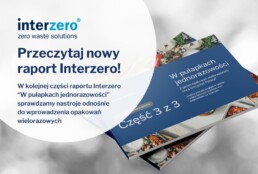
Are Poles ready for a world without disposables?
Leak-proof, lightweight and... a discount for using them? This is how Poles imagine the ideal reusable packaging - according to the latest Interzero report "Breakfast on non-styrofoam" . This is the third and final part of the series "In the traps of disposables" , which focuses on consumer attitudes towards reusable packaging.
We wrote more about the report carried out as part of the Eco without Kants campaign in the article SUP Directive, or a half-hearted revolution and "Waiting for a deposit" - what Poles know about the deposit system ... and what they don't know
In an era of growing environmental awareness, more and more companies and consumers are looking for ways to reduce single-use plastic. However, the reality is more complicated than it might seem. Interzero 's publication "In the Traps of Disposability" (Part 3) sheds light on the key challenges associated with the transition to more sustainable packaging. In this report, we examine why, despite good intentions and increasing regulations, it is still difficult to completely eliminate single-use products, and what solutions can help combat excessive waste production.
Ecology versus convenience - what do consumers choose?
Studies show that while environmental awareness is growing, for many of us convenience still trumps environmental concerns. One of the challenges highlighted by respondents is the issue of packaging for popular takeaways such as pizza, burgers and fries. For many, the idea of using reusable containers for fast food seems impractical - "I order pizza to avoid cooking and washing up, not to clean the container afterwards," says one of the respondents.
What does your favourite packaging look like?
Over 58% of Poles expect reusable packaging to be, above all, tight, easy to clean, and lightweight. Interestingly, for many, the key factor is also the possibility of obtaining a discount or reward for using it.
The report also shows that Poles are reluctant to use shared models - most prefer to have their own containers rather than borrow them from restaurants on a deposit basis. They are afraid of the mess, the need to store different packaging and the additional obligations associated with returning them.
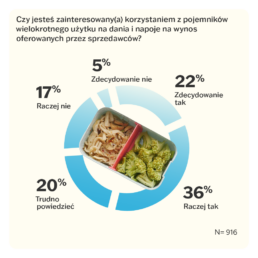
Why is it worth reading the report?
The report "Breakfast on Non-Styrofoam". is not just about numbers - it is primarily the voices of consumers , their opinions and real concerns. The collected data can be a valuable source of knowledge for entrepreneurs from the HoReCa, e-commerce or packaging manufacturers who want to better adapt their products to market expectations.
Read all sections of the report!
What happened in January? Read Interzero's summary of the last month
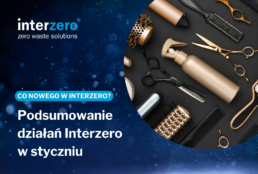
What happened in January? Read Interzero's summary of the last month
Nhe year began with enthusiasm and full commitment – we organised training, campaigns, educational workshops and we have launched a new service. Read on for a summary of January at the Interzero Group in Poland, where we outline the key events of recent weeks.
Further entities required to register with BDO
From 2025, the beauty industry is required to comply with new regulations on hazardous waste records. This major change, the obligation to register with BDO, will affect thousands of hairdressers, beauticians and other beauty industry service providers. We have launched a new form, which allows you to contact our company and take over the obligation to register with BDO.
New entry on the website translators to whom the new regulations apply, what penalties are available in the event of non-compliance and what waste is subject to registration with BDO.
New Interzero study: Businesses in the circular economy: a detailed analysis
Did you know that More than 70% companies want to implement sustainable initiatives? Closing the loop in the economy on a large scale is becoming a reality, as evidenced in thendings presented in Interzero's new study 'Businesses in the circular economy: a detailed analysis'. With data collected from high-level executives from six European countries (Italy, Austria, Poland, Slovenia, Croatia, Serbia). we can show that the adaptation of sustainable models in companies is a priority and brings numerous business benefits, including: reduced costs or increased innovation, as well as improved reputation. Our report presents the results of our sustainability trends survey, market expectations and related business decisions of medium and large companies in Europe.
"Waiting for the bail system" - the second part of the report "In the traps of disposability"
In January, the second part of Interzero's report 'In the traps of disposability' was published, entitled "Waiting for bail". This analysis of Poles' knowledge of the bail system shows, among other things, that:
- 23% of respondents had never heard of a bail system
- 41% are concerned that the turnaround points will be too far from their location
- 40% says you may need a receipt to get your deposit back
Even this cursory extraction from the data makes it possible to identify areas that need to be addressed with an appropriate information campaign to bring the way the bail system works closer to home.
The aim of the publication series 'In the Traps of Disposability', produced by Interzero on the basis of quantitative and qualitative research conducted by Opinia24, is to assess the impact of the Single Use Plastics (SUP) Directive coming into force. Speaking more extensively about this, she said on air Polish Radio Four Edyta Mantorska, Manager of the Interzero Environmental Education Team.
January webinar on changes to the bail system is over!
A webinar on the deposit system held on 16 January 2025, hosted by Pawel Sosnowski, Board Representative for Environmental Regulation at Interzero, provided participants with key information on the amendment of the Packaging and Packaging Waste Management Act.
The training discussed the details of the regulatory changes, including the postponement of the launch date for bail schemes, changes to covered drinks, new rules for collecting bail and the introduction of VAT on unclaimed bail.
A great value of the event was the rich Q&A session, which allowed participants to dispel numerous doubts and gain practical information on the new regulations. Thanks to the activity and commitment of the participants, the Q&A became a great opportunity to clarify any ambiguities and discuss problems that entrepreneurs may face.
Join us for a free webinar "Environmental obligations for companies selling to Poland - everything you need to know" in English, which will take place on 20 February 2025. The training will be led by Przemysław Kuna, Managing Director at Interzero.
4 nthese sections podcast "Eco without the corners"
Why are there differences between publicly available data on waste management? Why is it better to say plastics instead of plastic? What environmental topics did Poles live with in 2024 and what awaits us in 2025? These issues were discussed in the podcast 'Eko bez kantów'. We encourage you to listen to the latest episodes on the YouTube platform:
- "Waste and data - where do the discrepancies come from?" - Dr. Beata Waszczyłko-Miłkowska, IOŚ-PIB
- "Waste management - what do the figures tell us?" - Dr. Beata Waszczyłko-Miłkowska, IOŚ-PIB
- "2024 in ecology. What awaits us in 2025?" - Editors: Jakub Pawłowski, Aleksander Jakub Paszyński, Jakub Wojajczyk and Szymon Majewski
- "Plastic - we need it, although we don't like to admit it" - Dr Anna Kozera-Szałkowska, PlasticsEurope Polska
Early Bird promotion: tickets for the 2025 Environment Conference cheaper only until the end of February
The next edition of the Interzero Environmental Conference will take place on 3-4 June at the Warszawianka Hotel near Serock! This is a unique event that will allow you to learn about the latest legal changes in environmental protection. Promotion early birds runs only until the end of February, so don't delay - share this message with others now! It is also a great opportunity to make new business contacts. For more information on the event, see here.
Bio-waste collection needs to be improved: we only segregate 20% of the bio fraction
Bio-waste was supposed to be a source of ecological fertilizer and clean energy, and its processing was supposed to be a remedy for the growing minimum levels of recycling municipal waste. However, the reality turned out to be far from expectations - the bio-waste collection system is not fully effective, and the potential of this fraction is usually wasted in landfills.
Only 20% of all bio-waste is collected selectively
Currently, in Poland and across the EU , we process only a small percentage of the bio-waste we produce . This applies to both industrial and municipal waste. The Zero Waste and Bio-based Industries Consortium (BIC) report Bio-waste generation in the EU: Current capture levels and future potential estimates that each Pole can potentially generate 247 kg of bio-waste . This sum consists of:
- 112 kg of food waste,
- 135 kg of green waste.
Theoretical potential calculations were made based on a collection of public reports and national data.
However, according to the data provided by the Central Statistical Office, only 52 kg of bio-waste is selectively collected . Where does this difference come from? It most likely results from incorrect segregation of bio-waste - instead of the organic fraction, it ends up in mixed waste.
According to the calculations of the report's authors, in Poland only the following are selectively collected:
- 9% food waste,
- 20% of all bio-waste (food + green waste).
The average for EU countries is 24.9% for food waste and 30% for the entire bio-waste fraction.
As the authors of the report conclude:
The implementation of food waste collection strategies and practices will be one of the main factors increasing the overall recycling rate of bio-waste in the near future.
The untapped potential of food and catering waste
The aforementioned report by Zero Waste and the Bio-based Industries Consortium (BIC) indicates that as much as 75% of food waste generated in the EU remains unmanaged . This results in the loss of valuable resources that could be processed into natural fertiliser and alternative fuel, as well as excessive methane emissions that occur in landfills. In order to combat waste , Polish entrepreneurs operating in the catering industry and beyond are required to conclude an agreement for the collection and management of food waste they produce . This agreement can be concluded with a municipal company or with a specialised waste collection company, such as Interzero.
Cooperation with Interzero in the field of food waste collection from companies and institutions is a guarantee of its proper management. The catering waste we collect is transferred to specialized processing plants - composting plants and biogas plants, where it is subjected to composting and fermentation processes. Professional collection of food waste is one of the best ways to implement the idea of a closed-loop economy and to avoid legal consequences associated with improper management of bio-waste.
Industrial composters for food and catering waste
Food waste generated in companies can also be managed at source where it is produced. For this purpose, Interzero offers a range of electric composters for industrial use . They enable waste volume to be reduced by up to 90% and transformed into an excellent, nutrient-rich substrate (pre-compost) that can be used as a soil improver, biomass fuel or anaerobic fermentation raw material. The entire process takes just 24 hours and, thanks to the deodorisation system, is free from unpleasant odours .
The Oklin composter range also includes a device for home use. The Oklin GG-02 compact electric composter can be placed in the kitchen or pantry, providing a more convenient and faster alternative to composting kitchen waste in traditional composters.
Tightening municipal bio-waste collection as a chance to meet strict recycling targets
Bio-waste generated in households that is not managed at source must be selectively collected and then taken away by municipalities. However, the current collection systems are not perfect. In order to make it easier for municipalities to carry out tasks related to the effective collection and subsequent management of bio-waste, IOŚ-PIB has developed a Catalog of Good Practices in the Collection of Bio-Waste , which presents examples of efficient systems for managing biodegradable waste in Poland and Europe.
According to the report of the European Environment Agency, bio-waste constitutes approx. 34% of the stream of all municipal waste produced in the European Union. In Poland, this percentage was 37.4% in 2023. Considering the fact that from 2025 municipalities will have to achieve the 55% level of municipal waste recycling required by EU regulations, it will be necessary to focus on recycling bio-waste as the largest fraction . Is it possible? We talked about the problems and challenges of bio-waste management with Jan Kolbusz, Chief Technologist and President of Mikrobiotech in the Eko Bez Kantów podcast Clean Energy and Fertile Soil: How to Unlock the Potential of Bio-Waste?
Sources:
- https://biconsortium.eu/publication/bio-waste-generation-eu-current-capture-levels-and-future-potential-0
- https://stat.gov.pl/obszary-tematyczne/srodowisko-energia/srodowisko/ochrona-srodowiska-2024,1,25.html
- https://magazynbiomasa.pl/bioodpady-komunalne-jaki-to-potencjal-sprawdz-koniecznie/
